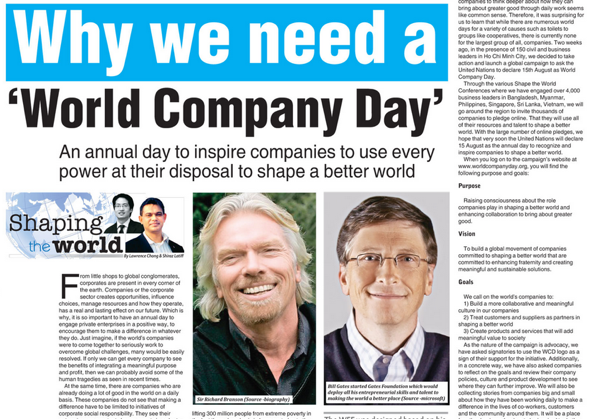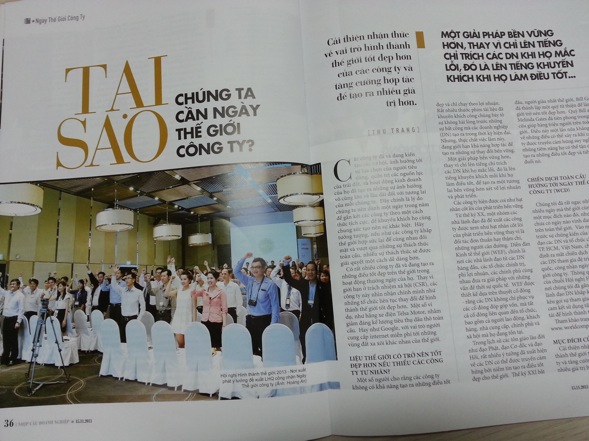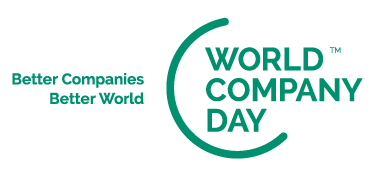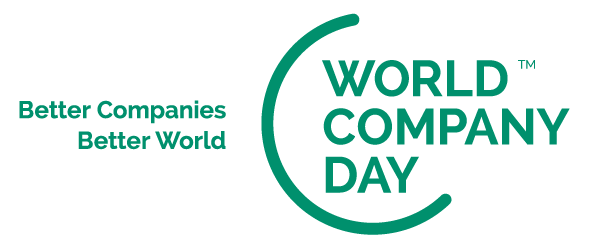
From little shops to global conglomerates, they are present in every corner of the earth. Companies create opportunities, influence choices, manage resources and how they operate, has a real and lasting effect on our future. Which is why, it is so important to have an annual day to engage private enterprises in a positive way, to encourage them to make a difference in whatever they do. Just imagine, if the world’s companies were to come together to seriously work to overcome global challenges, many would be easily resolved. If only we can get every company to see the benefits of integrating a meaningful purpose and profit, then we can probably avoid some of the human tragedies as seen in recent times.
At the same time, there are companies who are already doing a lot of good in the world on a daily basis. These companies do not see that making a difference have to be limited to initiatives of corporate social responsibility. They see their enterprises as constant change agents in order to shape a better world. Some obvious examples are, Elon Musk who is building Tesla to get the world to see the viability of electric cars and Google’s role in providing free access to the internet in the far-flung corners of our world.
Will the world be better without private companies?
There are some who strongly believe that companies are incapable of doing good and that profit will ultimately trump that desire. These critics, prefer to paint companies as doing the devil’s bidding. Unfortunately, with numerous scandals such as the reckless speculation of the financial sector which triggered the global crisis of 2008 to the abuse of garment workers in Dhaka, this seems to be the reality. A number of movies and documentaries, leveraging on the hatred of multinational firms, have also encouraged sustained public dissatisfaction about the disproportionate influence of companies in our modern world. But in doing so, it limits the possibilities of collaboration to bring about sustainable change.
If some of the more extreme voices were to have their way, which is to end the role of private enterprises, the world would be poorer, not richer. Communist ideology tried to achieve this by replacing the role of private enterprise through another form of wealth distribution and development but it failed. China’s amazing feat of lifting 300 million people from extreme poverty in the last three decades is in large part, due to the freedom of allowing people to create private enterprises and welcoming foreign firms to create opportunities. Therefore, a more sustainable solution is not to engage companies only when they make mistakes but to proactively inspire them to do good so as to create a more sustainable future for profit and growth. Sir Richard Branson, affirmed this through an interview with Thought Economies, “Increasingly we are hearing more about how big business needs to play its role in society for the greater good. We all have a role to play and it makes business sense. In fact, consumers demand that business be responsible.”
Companies are now seen as the core agents of sustainable development
From the 20th century, there emerged a movement of thinkers and leaders who proposed that companies be seen as key agents for sustainable development instead of been viewed as a mere partner or even an obstacle. The World Economic Forum (WEF) chaired by Professor Klaus Schwab, is an annual gathering of influential leaders from academics, non-profits, businesses and governments working to improve the state of the world. The WEF was designed based on his concept of Stakeholder Theory – that companies serve not only shareholders but all the stakeholders of their organization. This means all the social groups connected directly or indirectly to the enterprise which are dependent on its success and prosperity, including not just shareholders and creditors but also employees, customers, suppliers, the state and the society in which the enterprise is active. The WEF initiative which has now grown into an influential platform and it demonstrates what private enterprises in partnership with others can do to bring about greater good.
From major faith traditions, such as Buddhism, Christianity and Islam, numerous ideas have emerged about how businesses can be inspired by their faith to bring about common good. Chiara Lubich, an influential Catholic Leader in the 20th century, even founded a business model called the economy of communion in 1991. Launched in Brazil, it aims to nurture a new generation of companies following the example of the first Christian community in Jerusalem where “no one among them was in need”. The model places the human person at the center and aims to help those in need through their businesses. This approach has since been adopted by 750 small and medium enterprises in different parts of the world regardless of religious affiliation. The concept, though still in its infancy in terms of scale, has been seriously considered at various UN and EU forums. It was highlighted by Pope Benedict XVI in his papal encyclical Deus Caritas Est, “The Economy of Communion offers a practical demonstration that it is possible to give without losing and take without taking away”.
At the turn of the 21st century, the richest man in the world, Bill Gates decided to start a foundation which would deploy all his entrepreneurial skills and talent to making the world a better place. People then thought it was a publicity stunt but Bill Gates and his wife Melinda just went ahead. Who would have imagined that a man, who was so often demonized by the media and the public as the evil monopolist, was now going to make an even greater difference. Bill and his wife Melinda brought something different to the development sector led largely by NGOs and governments which is: effectiveness. From lowering costs of vaccines to funding cure for forgotten diseases that were unprofitable for pharmaceutical companies, the Gates foundation is blazing new trails. This is another affirmation of what can happen when businesses are inspired to reflect deeply about their potential to do good and then go on to do it.
The Global Campaign for a World Company Day (WCD)
The concept of having an annual day to inspire companies to think deeper about how they can bring about greater good through daily work seems like common sense. Therefore, it was surprising for us to learn that while there are numerous world days for a variety of causes such as toilets to groups like cooperatives, there is currently none for the largest group of all, companies. Two weeks ago, in the presence of 150 civil and business leaders in Ho Chi Minh City, we decided to take action and launch a global campaign to ask the United Nations to declare 15th August as World Company Day. Through the various Shape the World Conferences where we have engaged over 4,000 business leaders in Bangladesh, Myanmar, Philippines, Singapore, Sri Lanka, Vietnam, we will go around the region to invite thousands of companies to pledge online, that they will use all of their resources and talent to shape a better world. With the large number of online pledges, we hope that very soon the United Nations will declare 15th August as the annual day to recognise and inspire companies to shape a better world.
When you log on to the campaign’s website at www.worldcompanyday.org, you will find the following purpose and goals:
Purpose
Raising consciousness about the role companies play in shaping a better world and enhancing collaboration to bring about greater good.
Vision
To build a global movement of companies committed to shaping a better world that are committed to enhancing fraternity and creating meaningful and sustainable solutions.
Goals
We call on the world’s companies to:
1) Build a more collaborative and meaningful culture in our companies
2) Treat customers and suppliers as partners in shaping a better world
3) Create products and services that will add meaningful value to society
As the nature of the campaign is advocacy, we have asked signatories to use the WCD logo as a sign of their support for the initiative. Additionally, in a concrete way, we have also asked companies to reflect on the goals and review their company policies, culture and product development to see where they can further improve. We will also be collecting stories from companies big and small about how they have been working daily to make a difference in the lives of co-workers, customers and the community around them. It will be a place for other business leaders to be inspired to do the same.
This campaign is not meant to be a silver bullet to solve the world’s problems but the beginning of a discussion to seek a more sustainable role for all enterprises. Condemning and demonizing companies is not a sustainable solution but providing viable alternatives of doing business that is also making a difference is. On the day when we launched the concept, someone came up to us saying that this concept will be good for Vietnamese companies. It is good because it provokes them to think about their role and their place in society to serve the greater good. It is really strange why no one has thought about this earlier. We agree but nothing is ever too late. Companies should not be seen as faceless entities; within themselves, they are micro-communities of persons who are capable of fraternity, creativity and they desire the same goodness that everyone seeks. This is what a World Company Day is meant to inspire, just like what the term ‘company’ implies, that we are all on a shared journey and we need each other to secure the best solutions for our future.
Lawrence Chong is the CEO of Consulus, a company specializing in helping Asian firms rebrand and redesign their organizations to be more innovative through business design. Consulus has begun operations in Sri Lanka in partnership with Hummingbird International. Shiraz Latiff is the CEO/Lead Consultant of Hummingbird International, a regional knowledge house specializing in coaching, consulting & outsourcing through global partnerships & collaborations.
This article is part of a weekly column called Shaping the World where Lawrence and Shiraz share insights and ideas about building innovative Asian Brands. It is published by one of the leading dailies in Sri Lanka, Ceylon Today.
Dù là các cửa hàng tạp hóa nhỏ cho tới các tập đoàn đa quốc gia, họ đều hiện hữu ở mọi ngóc ngách của trái đất này. Các công ty đã và đang kiến tạo các cơ hội, ảnh hưởng tới lựa chọn của người tiêu dùng, quản trị các nguồn lực của trái đất, và cách thức hoạt động kinh doanh đã tạo ra những ảnh hưởng vô cùng lớn và lâu dài đối với tương lai của mỗi chúng ta. Đây chính là lý do chúng ta nên dành một ngày trong năm để gắn kết các công ty theo một cách thức tích cực, để khuyến khích họ cùng chung sức tạo nên sự khác biệt theo cách thức của riêng mình. Hãy tưởng tượng, nếu như các công ty khắp thế giới hợp sức lại để cùng nhau đối mặt và vượt qua những thách thức toàn cầu, nhiều thách thức sẽ được giải quyết một cách dễ dàng hơn.
Có rất nhiều công ty đã và đang tạo ra những điều tốt đẹp trên thế giới trong hoạt động thường ngày của họ. Các công ty này không coi việc tạo ra sự khác biệt cho tương lai đơn thuần giới hạn ở hoạt động trách nhiệm xã hội của doanh nghiệp (CSR). Họ nhìn nhận chính mình như những tổ chức liên tục thay đổi để hình thành thế giới tốt đẹp hơn. Một số ví dụ rất rõ ràng chính là hãng xe điện Telsa Motor, đầu tư sáng lập bởi Elon Musk, để cả thế giới thấy được tiềm năng của xe ô tô chạy bằng điện, nhằm giảm đáng kể lượng tiêu thụ dầu thô toàn cầu. Hay như Google với vai trò người cung cấp internet miễn phí tới những vùng đất xa xôi khác nhau của thế giới.
Liệu thế giới có trở nên tốt đẹp hơn nếu thiếu các công ty tư nhân?
Một số người cho rằng các công ty không có khả năng tạo ra những điều tốt đẹp và lợi nhuận chính là điều họ luôn hướng tới. Rất không may, với rất nhiều sờ-căng-đan như đầu cơ của thị trường tài chính đẫn dến cuộc khủng hoảng kinh tế toàn cầu năm 2008 cho đến lạm dụng nhân công ngành may ở Dhaka, điều này dường như không thể chối bỏ. Rất nhiều những bộ phim và các thước phim tài liệu, dựa trên sự ghét bỏ đối với các doanh nghiệp đa quốc gia, đã khuyến khích sự không hài lòng của công chúng đối với sự không công bằng các doanh nghiệp tạo ra trong thời đại hiện đại. Nhưng thực chất việc làm này, đang giới hạn khả năng hợp tác để tạo ra những thay đổi bền vững.
Một giải pháp bền vững hơn, thay vì gắn kết các doanh nghiệp khi họ mắc lỗi, chính là khuyến khích họ làm điều tốt để tạo ra một tương lai bền vững hơn xét về lợi nhuận và phát triển. Ông Richard Branson đã khẳng định điều này trong buổi phỏng vấn với Thought Economies rằng “Ngày nay chúng ta càng nghe nhiều về các doanh nghiệp cần đóng vai trò lớn như thế nào đối với xã hội để xây dựng xã hội tốt đẹp hơn. Tất cả chúng ta đều có vai trò này và điều này làm cho các doanh nghiệp tồn tại. Thực tế, nhu cầu người tiêu dùng chính là điều khiến các doanh nghiệp có trách nhiệm”.
Các công ty hiện được coi như hạt nhân cốt lõi của phát triển bền vững
Từ thế kỷ 20 phong trào của một nhóm các nhà lãnh đạo đã đề xuất các công ty được xem như hạt nhân cốt lõi của phát triển bền vững thay vì là đối tác đơn thuần hay thậm chí, những người cản đường. Diễn đàn Kinh tế Thế giới (WEF) được khởi xướng bởi Giáo sư Klaus Schwab, chính là nơi các lãnh đạo từ các doanh nghiệp hàng đầu, các tổ chức chính trị, phi lợi nhuận, chính phủ và các học giả cùng nhau đưa ra giải pháp với những vấn đề thời sự quốc tế. WEF được thiết kế dựa Thuyết Cổ đông của Ông – rằng các doanh nghiệp không chỉ phục vụ các cổ đông đóp góp vốn, mà tất cả các cổ đông liên quan đến tổ chức. Cổ đông được đề cập ở đây bao gồm tất cả các tổ chức xã hội gắn trực tiếp hoặc gián tiếp đến doanh nghiệp, bao gồm cả những người lao động, khách hàng, nhà cung cấp, chính phủ và xã hội mà doanh nghiệp này đang hoạt động. Sáng kiến WEF hiện đã phát triển trở thành một bệ phóng có tầm ảnh hưởng rất lớn và thể hiện việc các công ty tư nhân hợp tác lẫn nhau có thể đem lại những điều tốt đẹp như thế nào.
Trong lịch sử các tôn giáo lâu đời như đạo Phật, Đạo cơ-đốc và Đạo Hồi, rất nhiều ý tưởng đã xuất hiện về các doanh nghiệp có thể được truyền cảm hứng bởi niềm tin tạo ra điều tốt đẹp cho thế giới. Đầu thế kỷ 21 bắt đầu, người giàu nhất thế giới, Bill Gates đã thành lập một Quỹ từ thiện sử dụng tất cả những kỹ năng doanh nhân và tài năng của ông để làm thế giới trở nên tốt đẹp hơn. Ít ai có thể tưởng tượng rằng một người đàn ông, từng bị truyền thông và công chúng coi là kẻ độc tài, lại đang tạo ra những điều khác biệt cho thế giới. Bill và Melinda Gates đã tạo ra khác biệt ở nhiều lĩnh vực vốn được tiên phong và dẫn dắt bởi các chính phủ và tổ chức phi chính phủ (NGO). Từ giảm thiểu chi phí vắc-xin để cứu chữa những căn bệnh mà không đem lại lợi nhuận cho các doanh nghiệp dược phẩm, Quỹ Bill and Melinda Gates đã tiên phong trong việc cứu giúp hàng triệu người trên toàn thế giới. Điều này một lần nữa, khẳng định, về những điều có thể xảy ra khi các công ty được truyền cảm hứng suy ngẫm về những tiềm năng họ có thể tận dụng để tạo ra những điều tốt đẹp và tiếp tục theo đuổi nó.
Chiến dịch toàn cầu hướng tới Ngày Thế Giới Công ty (WCD)
Ý tưởng về một Ngày Thế giới Công ty để truyền cảm hứng cho các công ty suy ngẫm về việc họ có thể tạo ra những điều tốt đẹp hơn cho thế giới qua chính những công việc thường ngày của mình dường như một lẽ thường tình. Bởi vậy, chúng tôi đã rất ngạc nhiên khi có rất nhiều ngày thế giới cùng kỷ niệm vì 1 mục đích nào đó, hiện vẫn chưa có ngày nào dành cho các công ty trên toàn thế giới. Vào ngày 15 tháng 8 năm 2013, trước sự chứng kiến của hơn 150 lãnh đạo các doanh nghiệp và tổ chức chính trị tại thành phố Hồ Chí Minh, Việt Nam, chúng tôi đã quyết định ra mắt chiến dịch toàn cầu để cùng các doanh nghiệp tham gia đệ trình lên Liên Hợp Quốc để công ngận ngày 15 tháng 8 là ngày Thế giới Công ty. Thông qua các hoạt động của Chuỗi Hội nghị Hình Thành Thế Giới, nơi chúng tôi đã gắn kết hơn 4000 lãnh đạo doanh nghiệp khắp khu vực, chúng tôi sẽ kêu gọi sự tham gia của hàng nghìn doanh nghiệp, cam kết sử dụng tất cả các nguồn lực và nhân tài để hình thành thế giới tốt đẹp hơn.
Khi bạn truy cập trang web của chiến dịch tại www.worldcompanyday.org, bạn sẽ thấy mục đích và mục tiêu của chiến dịch toàn cầu này:
Mục đích
Cải thiện nhận thức về vai trò hình thành thế giới tốt đẹp hơn của các công ty và tăng cường hợp tác nhằm tạo ra nhiều giá trị hơn.
Tầm nhìn
Xây dựng phong trào các công ty trên toàn cầu cam kết hình thành một thế giới tốt đẹp hơn bằng cách tăng cường tình bằng hữu và phát triển các giải pháp bền vững và có ý nghĩa.
Mục tiêu
Chúng tôi kêu gọi các công ty trên thế giới:
- Xây dựng văn hóa hợp tác và có ý nghĩa trong công ty mình
- Coi khách hàng và đối tác là những đối tác chiến lược cùng hình thành thế giới tốt đẹp hơn
- Phát triển các sản phẩm và dịch vụ mang lại giá trị gia tăng cho xã hộ
Là một hoạt động hưởng ứng, chúng tôi đã mời các thành viên cam kết sử dụng biểu tượng của WCD như một dấu hiệu thể hiện sự ủng hộ và tham gia của họ vào sáng kiến này. Bên cạnh đó, chúng tôi khuyến khích các doanh nghiệp nhìn nhận lại các mục tiêu và rà soát lại văn hóa danh nghiệp, các chính sách, sản phẩm để tự nhìn nhận mình có thể cải thiện như thế nào. Chúng tôi cũng thu thập những chia sẻ, các câu chuyện từ các doanh nghiệp, từ nhỏ hay lớn, về công việc thường ngày của họ đã đang tạo ra những khác biệt đối với những đối tác, khách hàng và cộng đồng xung quanh như thế nào. Đây là một nền tảng để các doanh nghiệp khác được truyền cảm hứng tạo ra những giá trị tốt đẹp hơn ở tất cả các nơi trên thế giới.
Chiến dịch này không phải một phương thuốc kỳ diệu có thể giải quyết những vấn đề của thế giới, nhưng đây chính là điểm khởi đầu cho những cuộc hội thoại để tìm kiếm vai trò bền vững hơn cho tất cả các công ty. Vào ngày chúng tôi ra mắt WCD lần đầu tiên, đã có lãnh đạo công ty chia sẻ trực tiếp với chúng tôi rằng ý tưởng này sẽ tốt cho các doanh nghiệp Việt Nam. Ý tưởng này tốt bởi nó khuyến khích họ nghĩ về vai trò của mình, và vị trí doanh nghiệp mình đảm nhiệm trong xã hội để tạo ra một tương lai tốt đẹp hơn. Thật lạ là không ai nghĩ về điều này trước kia. Nhưng không bao giờ là muộn cả. Các công ty không nên là những thể chế vô danh, trong nội bộ mỗi công ty, họ chính là một cộng đồng vi mô của những cá nhân đoàn kết, sáng tạo và mong muốn tạo ra điều tốt đẹp giống nhau. Điều này chính là những gì WCD muốn truyền cảm hứng, giống như ý nghĩa của từ “công ty”, chúng ta đều ở chung một hành trình và chúng ta cần lẫn nhau để tạo ra những giải pháp tốt nhất cho tương lai.


Leave a Reply to Anonymous Cancel reply